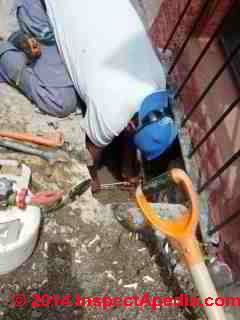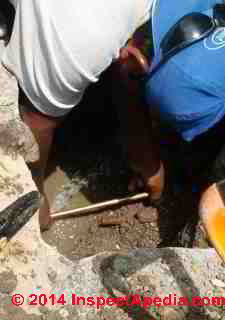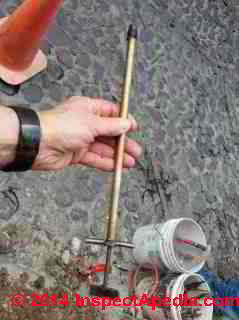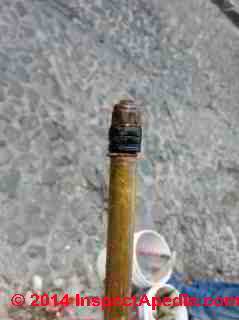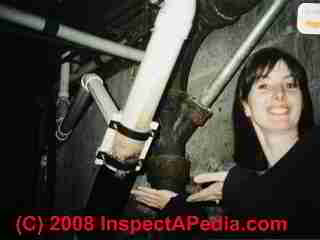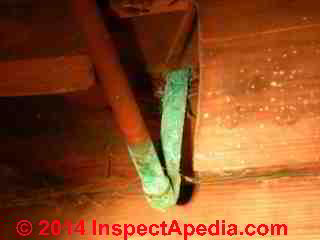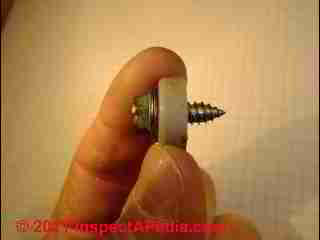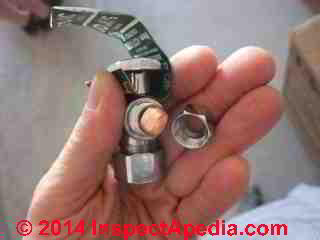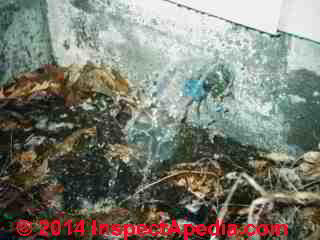 Fix Leaky Pipes in Buildings
Fix Leaky Pipes in Buildings
Emergency & other repair methods to shut off building water and/or repair leaky water supply or drain piping
- POST a QUESTION or COMMENT about pipe leak repair methos
How to fix leaky pipes in buildings:
This article describes emergency & other methods to shut off the water supply or how to fix a leaky water pipe when the main water shutoff is not working or not accessible. We discuss both water supply pipe leak repair methods and drain pipe repair methods used by homeowners, de-winterizing companies, and plumbers to deal with a variety of plumbing leaks.
Our page top photo shows water gushing out of a building foundation wall following a burst water supply pipe inside the structure.
InspectAPedia tolerates no conflicts of interest. We have no relationship with advertisers, products, or services discussed at this website.
- Daniel Friedman, Publisher/Editor/Author - See WHO ARE WE?
How to Repair Leaking Water Supply or Drain Pipes that Burst or Leak
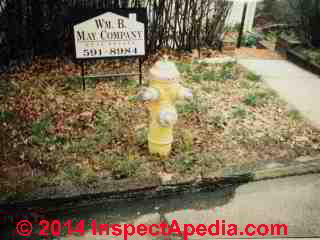 Building water supply or drain pipes may leak for any of a variety of reasons such as mechanical damage, puncture, corrosion, even poor workman ship.
Building water supply or drain pipes may leak for any of a variety of reasons such as mechanical damage, puncture, corrosion, even poor workman ship.
Here we use the example of discovering burst pipe leaks in water supply or drain pipes after a building has been left with no heat in freezing weather. The leak diagnosis and repair procedures will suit for most types of plumbing leaks in buildings.
At left our photo shows water in the street near a fire hydrant. But the water leak was not at the hydrant. The leak was in the supply pipe between the home and the street water main. Later in this article we describe emergency means of shutting off water at a building if the main water shutoff valve is inoperative or inaccessible.
[Click to enlarge any image]
Although we may have been careful to follow all of the best practices in winterizing a building, it is still possible that a pipe has frozen and burst during cold weather.
Watch out: unless you are trained and have the proper protective gear, do not enter wet or flooded areas where live electrical wiring, controls, or switches present electrocution or shock hazards.
See BUILDING ENTRY for DAMAGE ASSESSMENT
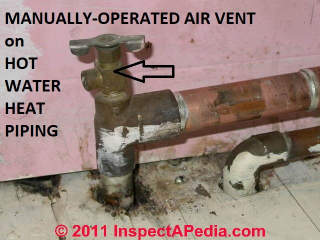 If a hot water heating pipe has frozen or a steam condensate heating pipe has frozen you won't see the leak until the building warms up but you may have trouble getting heat in some areas.
If a hot water heating pipe has frozen or a steam condensate heating pipe has frozen you won't see the leak until the building warms up but you may have trouble getting heat in some areas.
Our photo at left illustrates a leak at a hot water heating baseboard tee where an air bleeder was installed. Don't forget to check for leaks at such air bleed valves that may have been left open when a building heating system was drained for winterizing with heat off.
If a water supply pipe has frozen you will see the leak as soon as the building warms up and the frozen pipe thaws, unless water has been turned off.
If a drain pipe has frozen you'll notice it as the drain will be blocked. Worse will be the discovery of unsanitary water leaking when the piping thaws. Here are some tips for making repairs when these problems occur. A frozen fixture trap will be a smaller local leak that you should discover quickly by inspecting each fixture.
The exception which occurs commonly is a frozen bath shower trap in a bathroom over an unheated garage. Such traps or other plumbing leaks may drain into the garage ceiling where they cause more damage and take a bit longer to discover.
Find & repair the any frozen, leaky pipe breaks, cut out and replace that section of piping as follows:
We showed this water leaking down a wall also
at LEAK TYPES, WATER SUPPLY or DRAIN PIPES where we describe the different types of leaks that occur in building piping systems.
 The water seeping from the plaster wall shown at left was a leak that could teach us about water supply piping leaks and repairs: water was just seeping out of the wall until someone got curious and "poked" the wall to make a larger hole. Then water came spewing out of the wall from a burst main water supply pipe connected to municipal water.
The water seeping from the plaster wall shown at left was a leak that could teach us about water supply piping leaks and repairs: water was just seeping out of the wall until someone got curious and "poked" the wall to make a larger hole. Then water came spewing out of the wall from a burst main water supply pipe connected to municipal water.
Don't do that! Fortunately someone had the presence of mind to jam a stick into the hole to reduce the rate at which the building was flooding. The problem was there was no shutoff valve between this broken pipe and the city water main in the street of this building (in San Miguel de Allende, Mexico).
In this article, below
at SUPPLY PIPE LEAK REPAIR TOOL we show how the plumbers were able to install a shutoff valve upstream of the leaky supply pipe. First let's describe the types of leaks you may have to deal with in a building that has been left unattended.
- A temporary leaky pipe repair can be made using a clamp-on pipe patch; you'll need to buy a clamp-on patch of the proper diameter for your pipe.
A pinhole pipe leak (unlikely to occur in the case of freezing pipes) may be temporarily repaired by screwing in a small diameter sheet metal screw combined with a rubber washer. We've seen people try to repair a water supply pipe leak by wrapping it with electrical tape or duct tape: most likely you can slow but not stop a leak by this method. - How to cut out or remove and replace a broken frozen or leaky pipe section.
Replacing leaky threaded galvanized iron pipes: If the pipe is threaded galvanized steel it may be possible to cut the pipe in order to unscrew the damaged section in two parts, followed by installing two shorter threaded replacement sections combined with a union or coupling.
Replacing leaky copper pipes: If the broken leaky pipe is copper piping it can be cut with a pipe cutter or in close quarters with a hacksaw blade, followed by cleaning the exposed pipe ends, removing any water in the piping, and soldering in the new section.
Be careful not to set nearby building materials on fire. Wrap any nearby soldered pipe joints with a wet rag to reduce the chance that during your solder repair you accidentally de-solder nearby joints. It's possible to use copper pipe compression fittings as a means to connect cut copper pipe ends where soldering cannot be used.Replacing leaky plastic pipes: is usually easy, using new plastic pipe sections of the same material an the proper glue and pipe couplings. Just be sure to clean all of the pipe ends and fittings before applying the glue. Any grease or debris on the exposed plastic pipe ends can prevent the glue from bonding.
Watch out: failure to make your glue joints properly invites more piping failures & leaks.
See PVC & CPVC PIPE INSTALLATION STEPS
and
see PVC & CPVC PIPE GLUING SET & CURE TIMESLead water supply piping in a building should be removed and replaced entirely.
- Drain pipe repairs of copper or plastic drain lines can be made using the same procedures above. If your building has cast iron drain piping that has broken you'll need the services of a professional to cut and install replacement sections of cast iron; rubber Fernco™ type couplings can be used to patch in plastic drain pipes onto a cast iron or even copper drain line if necessary.
- Turn the water supply back on and check again for leaks
This Clever Tool Helps Repair Leaking Water Supply Piping Without Shutting off the Water Main
 At WATER HEATER PIPING we describe a water heater relief valve repair catastrophe when just touching parts led to a flooded basement.
At WATER HEATER PIPING we describe a water heater relief valve repair catastrophe when just touching parts led to a flooded basement.
In that case we were able to turn off the building water supply by shutting off electrical power to the water pump. But what if a pipe bursts and the building is connected to a municipal water supply? And worse, what if the main building shutoff valve is stuck, broken, or not accessible?
The water seeping from the plaster wall shown at left was a small seeping leak that left a small puddle on the floor of a restaurant in San Miguel de Allende.
But someone "poked" the wall to make a larger hole "just to see what was going on". Water came spewing out of the wall from a burst main water supply pipe.
Worse, here was no shutoff valve between this broken pipe and the city water main in the street of this building.
Jamming a stick back into the hole slowed the water back to a trickle, still faster than before. Then the restaurant owners called their plumber while staff moved furniture away from the wet area.
What was going to be interesting was how the heck to shut off water to this supply line when there was no shutoff at all between tho pipe in the wall and the city water main.
Here is what the plumber did.
First the crew dug in the sidewalk outside of this building wall (below left) to find the pipe bringing water to this location. That pipe was confirmed as connected to the city water main without a shutoff!
That's because the pipe leak location inside the building wall was between the existing "main shutoff valve" and the water main in the street. If this water supply had been from a private well we could at least have turned off the well pump even if there were no other working shutoff valves.
The flood would have stopped sooner. (Been there, done that.)
Next the plumber cut out a couple of feet of the supply pipe to obtain working room. When I took the next photo (above right) he was inserting a home made tool into the city water main. We show his tool just below (left).
This tool is a home made expander plug on the end of an extension long enough to allow the plumber to solder an appropriate connecting fitting on the cut-end of the pipe.
Turning the tee handle (bottom of photo at above left) expands the o-rings you can see in my close-up of the tool-end (above right).
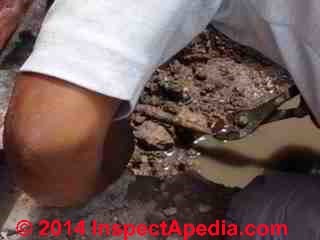 This tool allows the installation of any of several types of fittings, even soldered fittings onto the end of a "live" water supply pipe by shutting off its flow with a removable compression fitting.
This tool allows the installation of any of several types of fittings, even soldered fittings onto the end of a "live" water supply pipe by shutting off its flow with a removable compression fitting.
Finally the tool is removed and any remaining parts (shutoff valve for example) are installed on the now prepared end of the water supply pipe.
OK you say, but I don't have that neat tool and water is spewing into my home out of a copper supply pipe. What the heck can I do right now?
An alternative we've seen often is to simply crimp or bend the pipe end flat, then carefully (don't break it off) fold that bent section double to stop water (or oil or other) flow out of the copper piping.
This crimp and bend approach does not leave you with the option of connecting the bent over crimped end of piping to new fittings or a shutoff-valve, but it can stop water flowing from the line in an emergency.
We're back to a "cork-it" approach for which you could have used an expandable plug if you had one, or anything at hand to close off the leaky pipe until cooler heads and hands can finish the repair job.
Other versions of this pipe stopping tool and other ways to shut off a water pipe in an emergency are described
at EMERGENCY WATER SHUTOFF VALVE.
Other Leaky Water Supply Pipe Repair Methods
Chemical treatments like Stop-Leak for leaky heating boilers
CHEMICAL TREATMENTS, BOILER : leak-stop products used in hot water heating systems
Clamp-Around Patches for Leaky Pipe Repairs
Clamp-on leaky pipe patches: a pair of half-round clamps along with a rubber seal are bolted around a leaky supply or drain pipe to stop leaks without soldering or disassembly of the piping system.
Our photo (left) illustrates a clamp-on plumbing drain connection; similar devices can be used as a mechanical repair to stop leaks in both supply or drain pipes.
Epoxy Sealants for Leaky Pipe Repairs
Epoxy sealants for leaky pipes can be used to patch holes or corroded areas on water pipes, drain pipes, even pressure tanks: as a temporary and in my experience maybe unreliable repair.
Replace Leaky Piping & piping fittings
Some pipe leaks are attributed to a combination of faulty materials and sometimes water chemistry.
In these cases, such as corroded thin wall copper piping or leaks at plastic pipes or pipe fittings, repairing an individual leak may be little more than a stop-gap measure, as additional leaks are likely to occur.
At PLASTIC PIPE LEAK CAUSES and also
at PEX BRASS CONNECTOR LEAKS we describe leaks at types of plastic piping systems that may be endemic in a a building, requiring extensive pipe or connector replacement.
For this reason, an accurate diagnosis of the cause of the pipe leak is important in choosing an effective leaky pipe repair approach.
Other sources of green corrosion at water pipes can be meringue de-zincification leading to both pinhole leaks and blocked fittings (reduced water flow rate) especially at brass fittings. See the PEX article cited just above.
Screws with washers for pinhole leak repairs
Screws for small holes in leaky pipes? Screws along with a neoprene washer are turned into pinhole leaks in tanks or water pipes to stop small leaks.
Watch out: often the corrosion inside the pipe or tank is more extensive than you thought: messing with pinhole leaks can turn them into a spewing fountain of water.
See WATER TANK REPAIR PROCEDURES
In my opinion the screw and washer approach (photo at left) is more suitable for the larger diameter less rounded surface of a water tank than for most building piping, but this approach might suit in an emergency.
Tightning Leaky Compression Fittings
Leaks around compression fittings on water supply piping can sometimes be repaired by carefully tightening the fitting further.
Use two wrenches so that you tighten the parts without twisting the piping itself, especially where small diameter pipes are involved such as at toilet or sink water supply risers.
Watch out: over-tightening a compression fitting can split the compression ring leading to a worse leak than ever.
Tightening Leaky Shutoff Valve or Stop Valve Stem Caps
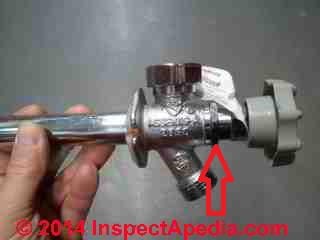 Tighten leaky water stop valves at plumbing fixtures, appliances, boiler drains, water heaters, or outside hose bibs.
Tighten leaky water stop valves at plumbing fixtures, appliances, boiler drains, water heaters, or outside hose bibs.
Often a leak around a valve stem can be stopped by tightening the cap nut on the stop valve. In our photo (left) my red arrow points to the stem packing nut that might, by tightening, stop a leak around this sill cock valve.
Watch out: over-tightening the cap nut on a stop valve, water main shutoff or any other valve can snap an internal part causing the leak to be worse than ever.
At WATER HEATER PIPING we describe a water heater repair catastrophe that occurred when just touching the water heater drain valve, leading to a flooded basement.
Wraps for leaky water pipe repairs
Sticky or even epoxy tapes can be wrapped around drain piping and sometimes even supply piping to stop leaks.
Use Staged Steps in Turning on Water Supply System to Minimize Water Leak Damage After Repairing a Leaky Pipe
Stop, look, and listen for leaks.Do not leave a building immediately after turning water on at a previously winterized or shut-down building before you have spent some time looking and listening for leaks, including the hiss, spurt, or just drip of a water supply pipe that may have burst hidden in a wall or ceiling cavity.
Even for buildings located in areas not subject to freezing and burst pipes, a staged water turn-on approach is useful. A pipe may have been damaged or cut by building activities, a trap may have corroded through, or other plumbing damage may be present even if no freezing conditions occurred.
Step by Step Details of the staged water-on procedure can be read
...
Continue reading at LEAK TYPES, WATER SUPPLY or DRAIN PIPES or select a topic from the closely-related articles below, or see the complete ARTICLE INDEX.
Or see these
Recommended Articles
- DRAINS & TRAPS RESTORATION to continue building de-winterizing procedures.
- EMERGENCY WATER SHUTOFF VALVE
Suggested citation for this web page
LEAKY PIPE REPAIRS at InspectApedia.com - online encyclopedia of building & environmental inspection, testing, diagnosis, repair, & problem prevention advice.
Or see this
INDEX to RELATED ARTICLES: ARTICLE INDEX to PLUMBING SYSTEMS
Or use the SEARCH BOX found below to Ask a Question or Search InspectApedia
Ask a Question or Search InspectApedia
Try the search box just below, or if you prefer, post a question or comment in the Comments box below and we will respond promptly.
Search the InspectApedia website
Note: appearance of your Comment below may be delayed: if your comment contains an image, photograph, web link, or text that looks to the software as if it might be a web link, your posting will appear after it has been approved by a moderator. Apologies for the delay.
Only one image can be added per comment but you can post as many comments, and therefore images, as you like.
You will not receive a notification when a response to your question has been posted.
Please bookmark this page to make it easy for you to check back for our response.
IF above you see "Comment Form is loading comments..." then COMMENT BOX - countable.ca / bawkbox.com IS NOT WORKING.
In any case you are welcome to send an email directly to us at InspectApedia.com at editor@inspectApedia.com
We'll reply to you directly. Please help us help you by noting, in your email, the URL of the InspectApedia page where you wanted to comment.
Citations & References
In addition to any citations in the article above, a full list is available on request.
- ABS Plastic Drain/Waste/Vent (DWV) pipe failures: reported for Centaur, Phoenix, Polaris, Gable, and Spartan pipe mfgs. for pipe made between 1985 and 1988. CPSC Hot Line: 800-638-8270 or ABS Drain Leaks/Failures-Class Action Settlement COX settlement through Shell Oil set up by a contractor involved in the settlement Plumbing Failures: Spencer Class settlement. 10% of replacement cost/damages, only for acetal (plastic)fittings Polybutylene plumbing lawsuit proposed settlement-old site
- Polybutylene Plumbing Failures, Lots of Info about, but slow-loading busy site
- "Water Saving Tips: For Residential Water Use, Indoors and Out", Alliance for Water Efficiency, 300 W Adams Street, Suite 601 Chicago, Illinois 60606, Tel: 773-360-5100, 866-730-A4WE, Email: jeffrey@a4we.org, web search 12/14/11, original source: plumbingefficiencyresearchcoalition.org/
- Our recommended books about building & mechanical systems design, inspection, problem diagnosis, and repair, and about indoor environment and IAQ testing, diagnosis, and cleanup are at the InspectAPedia Bookstore. Also see our Book Reviews - InspectAPedia.
- In addition to citations & references found in this article, see the research citations given at the end of the related articles found at our suggested
CONTINUE READING or RECOMMENDED ARTICLES.
- Carson, Dunlop & Associates Ltd., 120 Carlton Street Suite 407, Toronto ON M5A 4K2. Tel: (416) 964-9415 1-800-268-7070 Email: info@carsondunlop.com. Alan Carson is a past president of ASHI, the American Society of Home Inspectors.
Thanks to Alan Carson and Bob Dunlop, for permission for InspectAPedia to use text excerpts from The HOME REFERENCE BOOK - the Encyclopedia of Homes and to use illustrations from The ILLUSTRATED HOME .
Carson Dunlop Associates provides extensive home inspection education and report writing material. In gratitude we provide links to tsome Carson Dunlop Associates products and services.


